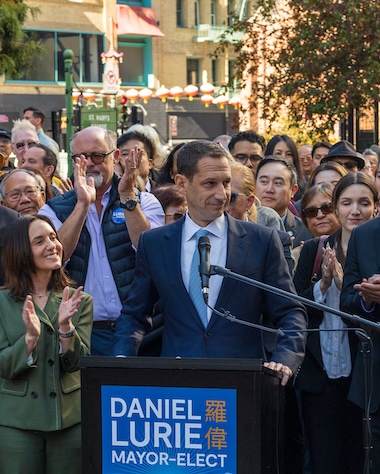Mayor Daniel Lurie now has the executive authority to raise money from private donors to help his crackdown on fentanyl. Normally (and for good reason) the supes have to approve any “behested payments,” like the ones that played a role in the recent City Hall corruption scandals.
But the board just gave up that authority, allowing Lurie to ask rich people to give money to any programs he wants to fund. The Chron has a lovely list of some of the people who might be taking a call from the mayor.

Never mind that one of the families on the list is the Fishers, whose greed has pretty much ruined the Oakland A’s and deeply damaged that city, and Chris Larsen, who the Chron says “has been a prominent civic booster of San Francisco” (I guess funding a billionaire takeover of the local Democratic Party to oust progressives is “civic boosting” at the Chron.
Oh, and Michael Moritz, who also has a bit of an ideological agenda in this city.
The whole concept of limiting behested payments was to prevent big donors from exercising too much influence at City Hall.
But let’s go a little deeper.
One of the fundamental tenets of neoliberalism, and to a certain extent Trumpism, is that the best solution to social problems is philanthropy, not government. The concept: Let rich people get tax breaks by giving some of their money to good causes, instead of having the much-maligned politicians and “bureaucrats” take that money through taxes and allocate it through some semblance of a democratic process.
This was part of Lurie’s campaign: Instead of taxing the rich, we will ask them nicely to fund some things that the city needs. That likely won’t be affordable housing; it probably won’t be the mayor’s priority of hiring more cops, since a one-time donation doesn’t help the city budget much. A one-time donation doesn’t provide long-term mental health facilities.
Lurie might be able to solicit money for some type of substance use treatment services, but if the money goes to legit groups like Healthright360, the folks there will follow the clear scientific evidence that forced treatment doesn’t work.
That’s not the mayor’s agenda.
So I don’t know how much the philanthropy of the local billionaires will do to address the crisis on the streets.
But there’s a larger issue here, and it’s one The New York Times took on a few days ago in a piece by two NYU business professors. It’s called “The Impossible Math of Philanthropy.”
Here’s the basic problem:
In recent years, Bill Gates, Warren Buffett, Michael Bloomberg and many others have poured billions into fighting poverty, protecting the environment and improving health outcomes. Corporate giving has also grown significantly over the past five years. Yet despite these efforts, income inequality is worse than it’s been since before the Great Depression, and poverty and its associated social pathologies remain stubbornly pervasive. What gives?
There’s a simple answer, one you’ll never hear in the grand halls of the charity gala circuit: The math of philanthropy simply doesn’t work. And it never will.
More:
More often than not, charities work to mitigate harms caused by business. Every year, corporations externalize trillions in costs to society and the planet. Nonprofits form to absorb those costs but have at their disposal only a tiny portion of the profits that corporations were able to generate by externalizing those costs in the first place. This is what makes charity such a good deal for businesses and their owners: They can earn moral credit for donating a penny to a problem they made a dollar creating.
Take the fast-food industry, where wages are so low that a majority of workers’ families are enrolled in public assistance. When an underpaid McDonald’s worker seeks a free meal at a soup kitchen, the soup kitchen is, in effect, stepping in to supplement a legal but inadequate wage. The lower the wage, the greater the profits for McDonald’s, which puts the soup kitchen in the position of indirectly subsidizing those profits.
The only way to change things?
The public would also need to develop greater skepticism of the rich entrepreneurs who, with more cash than they could ever spend, donate portions of their wealth to favored causes. Lionized for their achievements and revered for their compassion, they bask in their status as society’s saviors. Meanwhile, the corporations they own extract wealth and externalize costs on a scale that dwarfs their largess. With one hand they generate supernormal profits by plundering society, and with the other they dole out a few crumbs to “save the world.” But they never will. The math simply doesn’t work.
Philanthropy will never solve social problems. Thanks for trying, Mayor Lurie, but you can’t argue with decades of data. We have these problems to a great extent because the government at every level has cut taxes on the rich and created economic inequality.
San Francisco can’t solve that alone. But at least our local leaders could admit it.





